PURA accepted applications for 2025 PEGPETIA Grants in Docket No. 24-10-02 from September 3, 2024 to February 28, 2025.
All grant recipients must complete, sign, and return a completed State Vendor Form and Form W-9, via email to PEGPETIA@ct.gov by May 2, 2025. The State Vendor Form and Form W-9 do not need to be filed with PURA electronically. No grant funds may be distributed until this order is complied with.
PEG Grant recipients must complete, sign, and file (as compliance in Docket No. 24-10-02) a completed PEG Grant Production Agreement by May 2, 2025. No grant funds may be distributed until this order is complied with.
All grant recipients must complete, sign, and file (as compliance in Docket No. 24-10-02) a completed PEGPETIA Compliance form by May 15, 2026.
For help with the filing process, please review our filing instructions, see our resources on how to Make an Electronic Filing, or contact PURA’s Executive Secretary at PURA.ExecutiveSecretary@ct.gov.
PEGPETIA GRANT PROGRAM
Next Grant Cycle
The next grant cycle will commence in Docket No. 26-10-02 in the fall of 2026 and application instructions will be made available at that time.
The Authority has proposed the following biennial schedule:
| Grant Cycle (Docket No.) | Application Window | Disbursement | Project Implementation | Compliance |
| #1: 24-10-02 | Sept. 2024 - Feb. 2025 | June 2025 | June 2025 - May 2026 | May 2026 |
| #2: 26-10-02 | Sept. to Nov. 2026 | June 2027 | June 2027 - May 2028 | May 2028 |
| #3: 28-10-02 | Sept. to Nov. 2028 | June 2029 | June 2029 - May 2030 | May 2030 |
About
The Public, Educational and Governmental Programming and Educational Technology Investment Account (PEGPETIA) grant program provides funding to (1) promote and improve public, educational and governmental programming in Connecticut and (2) support education technology initiatives of boards of education and other education entities.
The Public Utilities Regulatory Authority awards 50% of funding as PEG Grants to promote and improve public, educational and governmental programming on community access channels in Connecticut, and the remaining 50% is awarded as ETI Grants to support education technology initiatives of boards of education and other education entities (PEGPETIA Educational Grant Guidance).
See below for responses to frequently asked questions.
Forms
- Docket No. 24-10-02 PEGPETIA Compliance
- Docket No. 24-10-02 PEG Grant Production Agreement
Archived Forms
- Docket No. 24-10-02 PEGPETIA Application
- Docket No. 24-10-02 PEGPETIA Itemized Budget
- Docket 23-10-02 PEGPETIA Compliance
Application Submission
Each PEGPETIA Grant Application must be filed as a separate motion in Docket No. 24-10-02. Grant applications must be submitted between September 3, 2024 and February 28, 2025.
Once you have created an account, your application may be filed as a motion by first selecting “Add to a Current Docket Filing” on the Web Filing Start Page. Please do NOT select “File a New Docket Application.”
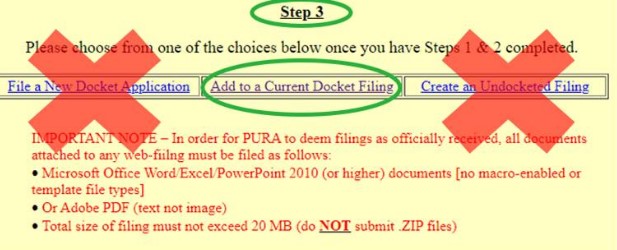
Applications must be submitted in accordance with the instructions included in the Application and Itemized Budget forms above. The Authority will not accept applications for projects that have already been completed.
Grant Application Process
Eligible Applicants
Applicants for PEG Grants must meet one or more of the following categories:
a. Local community antenna television and video advisory council;
b. State-wide video advisory council;
c. PEG programming producer; or
d. PEG studio operator.
Applicants for ETI Grants must meet one or more of the following categories:
-
Board of Education;
-
Public library; or
-
Other education entity
Organizations must be registered with the Connecticut Secretary of the State, where applicable, and must also be up to date with state filing obligations.
*COMPLIANCE REQUIREMENTS FOR PRIOR GRANT RECIPIENTS*
Pursuant to the Authority's orders in Docket No. 19-11-01, Docket 21-10-13, Docket No. 22-10-02, and Docket No. 23-10-02, grant recipients are required to submit the following:
1. Receipts and/or purchase orders for all equipment and approved costs in relation to grants awarded;
2. For PEG Grant recipients, a report providing the title, subject, and duration of all community access programs facilitated by the grant award; and
3. An overall account of the success of the project.
This information must be filed electronically in the applicable docket as Compliance. Failure to provide required compliance may result in ineligibility for a 2025 PEGPETIA grant.
Grant Recipients in Docket No. 23-10-02 must file compliance by January 3, 2025, and may use the 23-10-02 Compliance Form.
Eligible Projects
PEG Grants may be awarded for investments that are designed to improve or promote PEG programming. Although funds are available to a wide variety of entities involved either directly or indirectly in producing community access programs, the award of funds to those entities is not the goal of the program. Rather the funds are intended to be used for capital and equipment costs that aid the production and procurement of public, educational and governmental programs. Accordingly, grant recipients are required to file a report with the authority, stating (a) the title, subject and duration (in minutes) of all community access programs facilitated in whole or in part by the grant award; (b) how the programs were distributed through community access channels; and (c) the protocols for ensuring that any programs produced with equipment purchased with PEGPETIA funds are made available in the applicant’s local PEG studio. Additionally, PEG grant recipients must also file a report after project completion enabled by the grant funds to ensure the funding is used appropriately.
ETI Grants may be awarded for the support of education technology initiatives boards of education and other education entities, including both public and private schools. Accordingly, ETI grant recipients must file a report of the completed project enabled by the grant funds to ensure the funding is used appropriately.
The investment or initiative should adhere to the criteria established in the PEGPETIA Decision dated March 26, 2008, Docket No. 07-10-11, DPUC Proceeding To Establish Administrative Guidelines For The Public Educational And Governmental Programming And Education Technology Investment Account Pursuant To Public Act 07-253, including:
-
Consistency with PEGPETIA program goals;
-
Increased quality and quantity of community access programs as well as educational technology initiatives;
-
Clear, fair and broad eligibility requirements;
-
Transparent, applicant friendly and not burdensome application process;
-
Impact on a diverse and broad segment of subscribers and/or students;
-
Reasonable budget and project schedule; and
-
Ensuring awarded funding expenses are properly documented by each recipient.
Application Review and Grant Approvals
Following the conclusion of the application period, the Authority will review all properly completed and submitted applications to determine whether each applicant and investment/initiative meet the eligibility requirements for PEGPETIA grants. For eligible applicants and investments/initiatives, the Authority will evaluate the application based on the guidelines established in Docket No. 07 10-11, as modified in 07-10-11RE01. Upon completion of its review, the Authority will issue a decision notifying the applicants of its determinations.
Grant Distribution
Each grant recipient must submit a W-9 and State Vendor Form to the Department of Energy and Environmental Protection (DEEP) Business Office by May 15, 2026, as stated in the Authority’s decision in Docket No. 24-10-02. After all necessary documents are received, DEEP will direct the issuance of a check in the amount of the grant awarded by the Authority.
Compliance
Grant recipients will be responsible for complying with all Authority orders in Docket No. 24-10-02.
Filing Process
For help with the filing process, please see our resources on how to Make an Electronic Filing, or contact PURA’s Executive Secretary at PURA.ExecutiveSecretary@ct.gov.
If you are seeking a communication aid or service, have limited proficiency in English, or require some other accommodation, including equipment to facilitate virtual participation, please contact the Department of Energy and Environmental Protection Office of Diversity and Equity at (860) 418-5910, or via email at deep.accommodations@ct.gov. For accommodation for hearing impairment, call 7-1-1, the State of Connecticut relay number.
FAQs
Q. What is PEGPETIA?
A. PEGPETIA stands for the Public, Educational, and Governmental Programming and Education Technology Investment Account. PEGPETIA was established by the General Assembly on July 1, 2007, (see General Statutes 16-331cc) and PEGPETIA Grants provide funding to schools, towns, and producers of public, educational, and governmental programming in Connecticut. The Authority conducts a biennial proceeding to determine the allocation of the accumulated funding in the account and to administer grants to eligible entities.
Q. How is PEGPETIA funded?
A. The funding comes from a quarterly tax on the gross earnings of video service providers.
Q. Who can apply for a PEG Grant?
A. PEG Grant funds are available to entities involved in producing public, educational, and governmental programming (PEG). A recipient may be a local community antenna television and video advisory; state-wide video advisory council; public, educational, and governmental programmer; or public, educational, and governmental studio operator.
Q. Can an individual apply for a PEG Grant or an ETI Grant?
A. No, individuals are not eligible to apply for grants.
Q. Who can apply for an ETI Grant?
A. ETI Grant funds are available entities for an education technology initiative (ETI). A recipient may be a board of education, public library, or other educational entity.
Q. Where do I need to file my application?
A. To be considered for a 2025 grant, your application, including an itemized budget, must be filed as a motion in Docket No. 24-10-02 by February 28, 2025.The PEGPETIA Application and PEGPETIA Itemized Budget forms are available above.
Once you have created an account, select “Add to a Current Docket Filing” on the Web Filing Start Page:
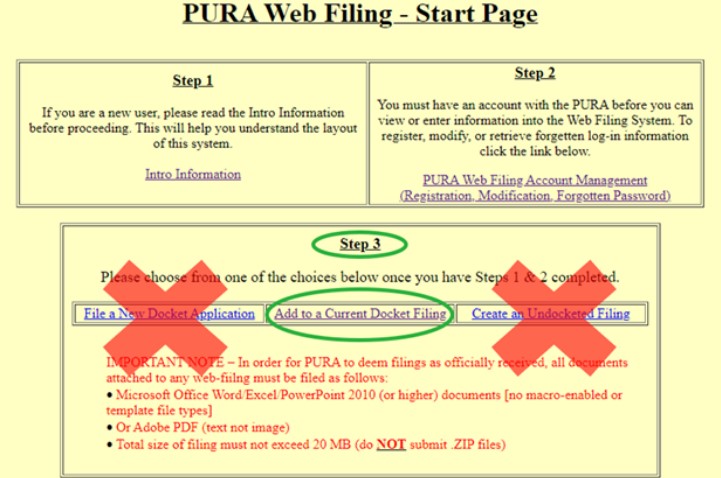
Then enter the Docket Number (24-10-02) and ensure that the correct Docket Title populates (Annual Allocation of Public Educational and Governmental Programming and Education Technology Investment Account pursuant to Conn. Gen. Stat. § 16-331cc):
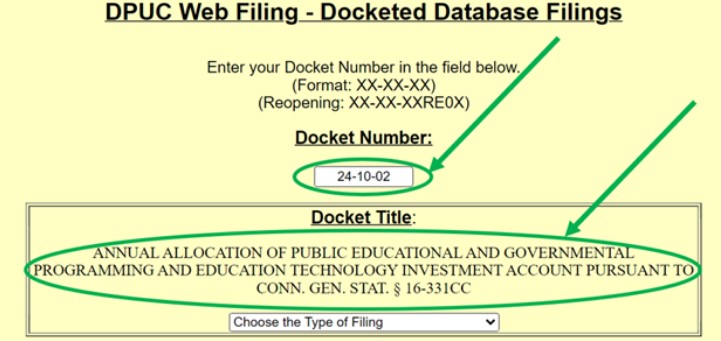
On the next screen, choose “Motions” as the type of filing from the drop-down menu.
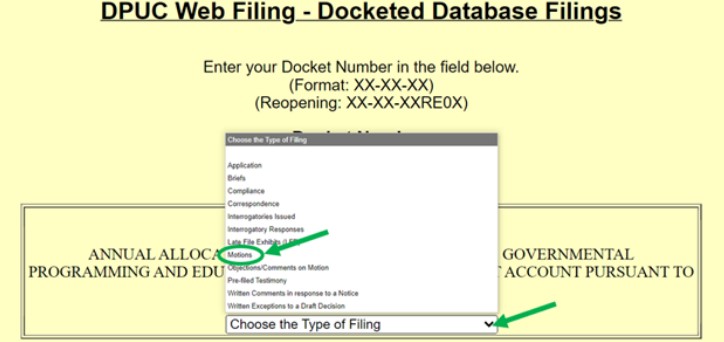
On the following screen, complete the “On Behalf of What Entity” and “Pertains to What Entity” with the applicant’s name, attach the competed Application, Itemized Budget, and additional documents. Links to forms, including the PEGPETIA Application and PEGPETIA Itemized Budget, are available above. Please note that the application materials have been revised for Docket No. 24-10-02.
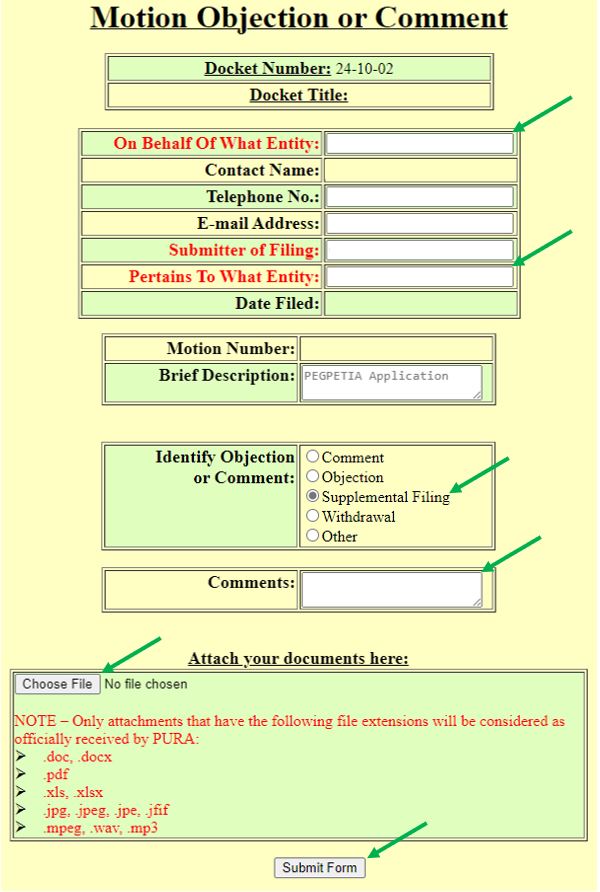
The allowable electronic filing size is 20 MB. If the Application and attachments exceed the allowable limit, the Application form must be filed as a motion, and the applicant’s additional attachments must be filed as a comment. Subsequent filings pertaining to the Application must be filed as a comment the applicant’s motion, using the assigned motion number (select Objections/Comments on Motion as the type of filing in the drop-down menu).
Q. How do I file something with PURA?
A. You must first register here to access the web-filing account management system and submit an electronic filing to PURA. If you have not yet created an account, please select “Create a New Account” and follow the instructions. Please note that it may take an hour before your account is activated.
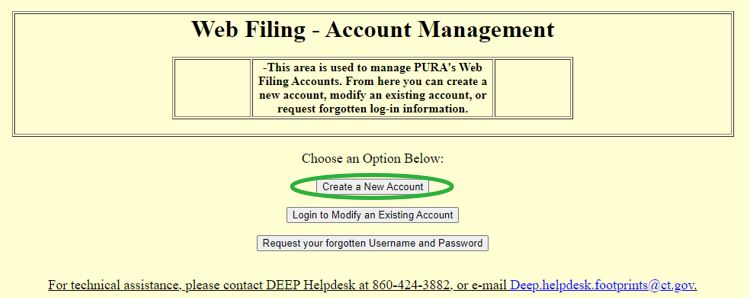
Registration instructions can be found at: How to Register with the PURA website. From there you can create a new account, modify an existing account, or request forgotten log-in information.
For more information, visit Make An Electronic Filing, or contact PURA’s Executive Secretary at PURA.ExecutiveSecretary@ct.gov.
Q. When can I apply for a PEGPETIA grant?
A. Applications in Docket No. 24-10-02 are being accepted from September 3, 2024, through February 28, 2025. You should file your application as soon as possible, in case there is missing information or an error that must be corrected.
Please create an account and access PURA’s system in advance to avoid missing the deadline.
Applications received after the deadline may be ineligible for funding in Docket No. 24-10-02.
Q. What may PEG Grant funds be used for?
A. PEG Grant funds may be used to promote and improve public, educational, and governmental access programming in Connecticut. PEG grant funds should be used for capital and equipment costs that aid the production or procurement of public, educational, and governmental programs.
Q. What may ETI Grant funds be used for?
A. ETI Grant funds may be used for the support of education technology initiatives boards of education and other education entities, including both public and private schools.
Q. How is “education technology initiative” defined?
A. The term “education technology initiative” is not defined in the PEGPETIA statute, but the General Assembly has expressed its understanding of education technology through Chapter 61a of Title 4d of the General Statutes, which is entitled “Education Technology” and establishes a committee to implement state-wide education technology goals. Further information can be found at: PEGPETIA Educational Grant Guidance (ct.gov).
Q. What types of things can grant funds be used to pay for?
A. Grant funds should primarily be used for the purchase of equipment. Non-equipment costs, such as design and engineering, installation, training, warranties, or insurance, must be reasonable and should be limited to less than 10% of the overall grant. Software may be categorized as equipment.
PEGPETIA grant funds may not be used on non-equipment costs such as salaries, service agreements, or stipends.
Q. Can I apply for a grant for a completed project?
A. No, completed projects are ineligible.
Q. Can I apply for a grant for a partially completed project or a project with phases that are incomplete?
A. A partially completed project or a project with phases that are incomplete may be eligible for funding. Please indicate in your application what part(s) of the project are incomplete and how the requested funding relates to the project.
Q. When can I receive compensation available under the program?
A. Once an application is approved and a decision is rendered, grant recipients must complete, sign, and return a completed Form W-9 and Agency Vendor Form, to the DEEP Business Office. After the forms are completed, the Authority will direct that a check be issued. The Applicant will have to submit any compliance filings ordered by the Authority. After making the expenditures, the Applicant must submit copies of receipts and proof of payments.
Q. What kind of reporting is required after I receive a grant?
A. Award recipients must comply with the reporting requirements, including providing a summary of the impact of the grant funding to the Authority, as will be outlined in the Authority’s decision. The time frame for complying with these requirements will also be stated in the Authority’s decision.
Q. What happens if my application is denied?
A. If your grant application is denied, you may submit a new grant application for the next grant cycle.
Q. How can I learn more about PURA?
A. You may find it helpful to watch the informational videos and recordings of public meetings that PURA shares on its YouTube channel: Connecticut PURA - YouTube.
Q. What is the total award amount of the grant?
A. The amount of available funding will not be known until after the close of the application process, on February 28, 2025. In addition, grant amounts will depend on the number of successful applicants.
Q. Can mortgage payments be classified as a capital expense for PEG grants?
A. Traditionally, mortgage payments do not qualify because they relate to completed projects. PEG Grants are meant to subsidize capital and equipment costs related to producing and procuring PEG programming. The fund is intended to promote and improve public, educational and governmental (PEG) access programming in Connecticut. The goal of PEGPETIA is to increase the quantity, quality, and variety of community access productions available to subscribers by making funds available to a wide array of entities involved in community access-related activities.
Q. What considerations are taken when allocating PEG funds to a smaller program serving hundreds of customers verses a larger program serving thousands?
A. The allocation process is flexible and not solely based on community size. Applicants are encouraged to provide comprehensive information about the impact of their planned project for the Authority’s review.
Q. Can PEG funds be allocated to schools?
A. Schools may elect to apply for a PEG grant if the project to be funded will result in the production of public, educational, or governmental programming.
Q. How are specific projects or line items evaluated for grant eligibility?
A. Applicants should clearly explain the project and how the equipment relates to the project, if it is not self-explanatory. Applicants are responsible for thoroughly answering all questions in the application and providing sufficient information to support their requests.
Q. Can PEG funds be used to create internet programming?
A. PEG funds can be used to create programming that will be available on the internet, to increase the households that can access the programming. However, applicants are responsible for ensuring that programs are made available to the applicant’s local PEG studio.
Q. May an entity submit more than one application?
A. Absent extenuating circumstances, all projects should be consolidated into one application. Applicants may assign different names or IDs to projects to help distinguish the supporting documents associated with each project.
Q. What equipment may be purchased with an ETI grant?
A. Grant funds may be used for education technology initiatives. The term “education technology initiatives” is not defined in the PEGPETIA statute, but the General Assembly has expressed its understanding of education technology through Chapter 61a of Title 4d of the General Statutes, which is entitled “Education Technology” and establishes a committee to implement state-wide education technology goals. More information is available at PEGPETIA Educational Grant Guidance.
Q. Where can applicants check the schedule of Docket No. 24-10-02?
A. Applicants can find the PEGPETIA docket by searching the docket number, 24-10-02, in the PURA Docket System. From there, the applicant can click on the “TS External” link. Please open the PDF for format that is easier to read.
Q. May grants provide funding for additions related to previously completed projects, such as updates or necessary training on acquired technology?
A. Grant funds may be awarded for updates, training, or other items related to previously acquired equipment, if the updates, training, or other items will meet the goals of the PEG and ETI grants (i.e., resulting in more or improved programming or supporting educational technology initiatives).
Q. What if an explanation does not fit in the application form, compliance form, or other form?
A. An additional PDF or other document can be attached or added as a supplemental filing to the application.
Q. How can I get assistance with submitting my application materials?
A. Please contact the case coordinator, Ussawin Bumpen, at Ussawin.Bumpen@ct.gov, or contact the PURA Executive Secretary at 860-827-2836 or PURA.ExecutiveSecretary@ct.gov

